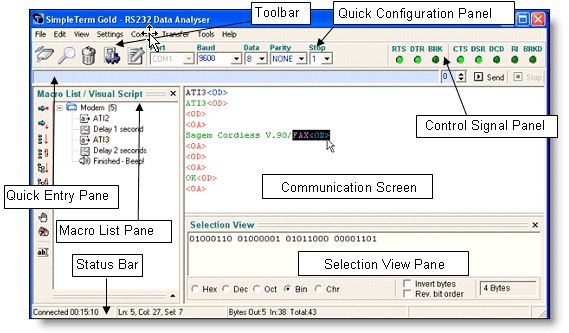


# max 128 characters, timeout=10s, then output $RESPĪn example of using the script. One thing that generally confuses people is. This will set the baud rate to 9600, 8 bits, 1 stop bit, no parity: stty -F /dev/ttyS0 9600 cs8 -cstopb -parenb. This will show all settings on the first serial port (replace ttyS0 with ttyUSB0 if using an USB serial port): stty -F /dev/ttyS0 -a. The bash shell is not fit to do serial port access under a complex OS like FreeBSD. You can use the stty command to set such parameters. # Wait for, and read a line from the serial port into RESP, Remember that writing to a serial port under a multi-user system like FreeBSD is much more complicated than on a simple 8 or 16 bit processor board. # that the response will end with an EOL character. # and wait for, and output the response, it is assumed # Send a packet to the specified serial port If your response packed ends with a character other than an EOL character then you can specify a delimiter to read using the -d command-line option.Īgain it’s all a bit long winded, so we can wrap it all up in a bash script ( send_tty.sh) as follows: #!/bin/sh echo then sends the packet which will result in a response. This gets read to wait for up to 20 seconds (-t20) for a line of data (max size, 60 characters -n60) from /dev/ttyS0, which it reads into RESP, it then echos $RESP – all of this happens in the background. This is a bit harder, but if your response ends with an end of line character, or another known character then we can use read to help with this…įirst we setup a read command in the background, unlike cat, this command will end when a response is received or when the timeout time arrives, then we can send our command: (read -n60 -t20 RESP /dev/ttyS0 Which works but it a bit of a mouth-full! cat continues to run in the background, and will print more responses as they arrive.īut what if you want to just send one packet and then wait for a single response? # Send the command, cat should print the response For example, if we start cat in the background and then send the command, cat will report the response as follows: # Run cat in the background Well, it is, but it requires a bit of sleight-of-hand. So is it possible to write and then read the response from a single shell instance? However cat must typically be run from a different shell instance as it blocks waiting for data. Sending data to a serial port is quite easy in Bash, for example: echo "my packet data" > /dev/ttyS0Īnd you can read from a serial port using cat:


 0 kommentar(er)
0 kommentar(er)
